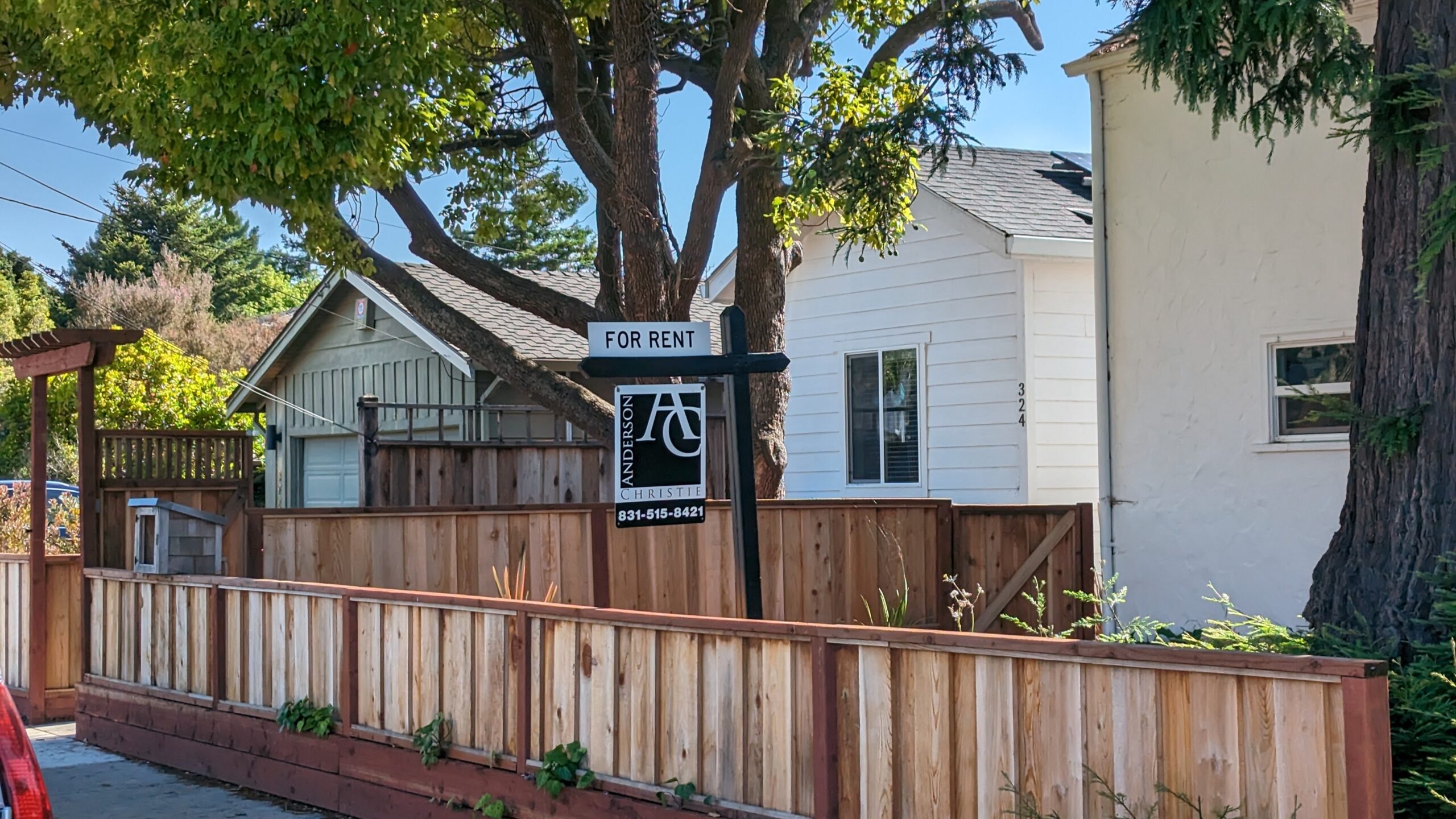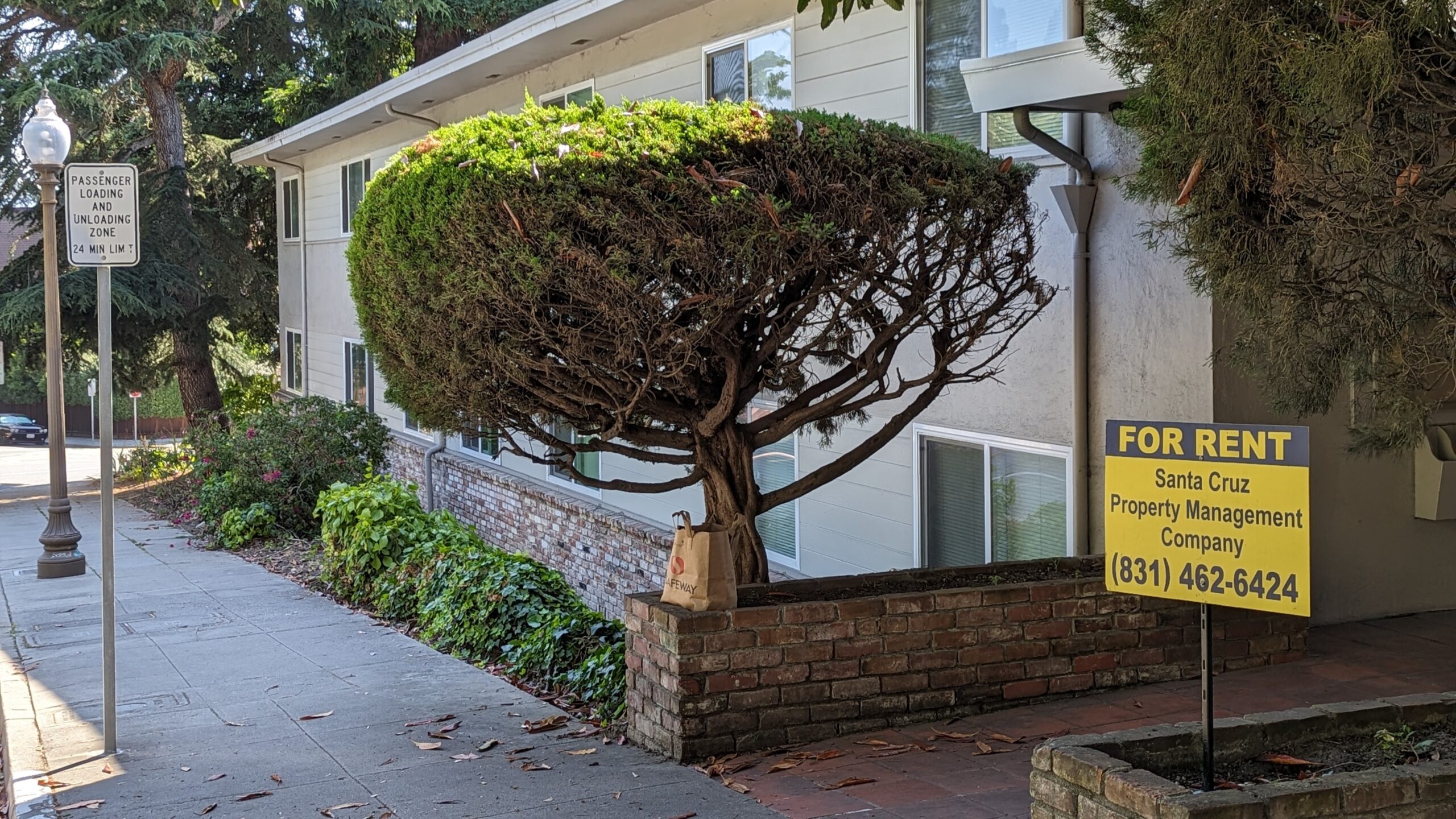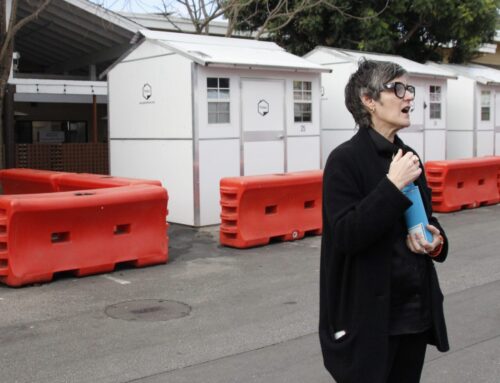
A home is advertised for rent on California Street in Santa Cruz in June 2023. Anderson Christie Real Estate charges a $30 non-refundable application fee which includes a credit report and other inquiries into the prospective tenant’s history. (Stephen Baxter — Santa Cruz Local file)
SANTA CRUZ >> When Elizabeth Cortez’s landlord told her last year that he was selling the Live Oak apartment she and her family rented, she expected a difficult process.
Her family — two parents, a brother, a partner and two kids — moved several times in the 20 years she’s lived in Santa Cruz County. But she was still surprised at the expense of her recent housing search.
Cortez, a dental assistant, scraped money together for a deposit and moving costs. Then there were rental application fees just to be considered for a new home. The application fees ranged from $30 to $50 for each applicant in her five-adult household. Landlords have said they check each applicant’s background to ensure all the tenants can pay rent.
They were repeatedly rejected. When landlords or property managers gave a reason, they said her family’s credit scores were too low. With more and more credit checks, their scores dropped several points during their housing search.
The breaking point came when her family applied for two Live Oak apartments managed by the same company. The company insisted each family member pay the $40 application fee twice. They were not accepted to either apartment, and were out $400.
In many cases, she wondered if the landlord or property manager had even checked her credit.
“I don’t know if they really kept my application, or if they just kept my money,” Cortez said in Spanish.
Cortez is now part of a group that is advocating to ban rental application fees in California. Some state legislators from Santa Cruz County and elsewhere have proposed tighter regulations of rental application fees, but advocates said more rules would not fix the problem like a ban would.
Some landlords and their advocates said the fees are necessary to vet potential renters. Some states have banned the fees, but those bans often go unenforced.
Renters’ rights
- Prospective tenants are entitled to a copy of their credit report if a landlord or property manager runs a credit check, according to state law.
- Landlords cannot charge more than $62.02 per rental application in California in 2024. The fee increases annually in line with the consumer price index.
- If the landlord or property manager charges an application fee but does not perform a credit check, the landlord must return the unused portion of the fee if asked.
- Landlords and property managers cannot charge prospective tenants to be added to a waitlist for a home unless the applicant agrees to it in writing.
Source: California Civil Code
Advocates against application fees
Cortez’s experience is representative of an issue that plagues local renters, said Barbara Meister, a founding member of Communities Organized for Relational Power in Action, or COPA. It is a group of 27 organizations that include faith groups, unions and schools across the Monterey Bay area.
The rental application fees are “an extra burden that’s been placed on tenants in a market where there’s so few supply and such high demand,” Meister said. Some landlords “take advantage of that desperation,” she said.
Now the group is asking state lawmakers to eliminate the fees.
During the early months of the COVID-19 pandemic, COPA organized Zoom meetings for people who were accessing a food pantry at Holy Cross Church. During the meetings, COPA leaders helped attendees understand their rights under the temporary eviction moratorium. They helped tenants navigate rental assistance programs. Cortez was one of the tenants who attended the meetings.
Cortez received rental assistance, but when she had to move, she told Meister about all the money she was spending on rental application fees. Cortez asked why landlords were allowed to charge the fees.
“Those of us on our COPA housing team were like, that’s a very good question,” Meister said.
COPA member Kim Kendall said she spent about $100 on application fees during her last housing search. “Although I can afford it, other people can’t,” said Kendall.
One property owner told Kendall that they had received more than 50 applications for a townhome, she said. “I noticed it back on the market three months later, collecting application fees again.”
Meister and Kendall suspect that some owners are unethically profiting from the high volume of applications in Santa Cruz County’s crowded rental market.
Santa Cruz landlord Cathy Calfo charges prospective tenants $35 for a background check. After Meister told Calfo some of the renters’ stories, Calfo decided she would support a law to abolish the fees.
“I was kind of skeptical at first,” that landlords could get a meaningful profit from application fees alone, she said. “But then I was doing the math.”
Advertisements for apartments on Craigslist or Zillow regularly get more than 100 applications, she said. “If you even charged half of those applicants $50, you’d be making $2,500.” For some smaller apartments, collecting application fees could feasibly raise more money than a month’s rent, she said.
Many property managers and owners in Santa Cruz County charge similar application fees:
- Santa Cruz Property Management Co. charges $25 per applicant, a representative said.
- Anderson Christie Real Estate charges $30 per applicant, according to its website.
- High Tide Real Estate charges $50 per applicant, a representative said.
Anderson Christie, for instance, wrote that the application fee covers “the cost of processing individual applications, obtaining individual credit report, investigating applicant’s residential history, fraud warnings, verifying employment history and salary, social security number verification, and costs associated with verification of references.”

A unit is for rent on Walnut Avenue in Santa Cruz in June 2023. Santa Cruz Property Management Co. typically charges prospective tenants a $25 application fee. (Stephen Baxter — Santa Cruz Local file)
Legislative efforts
Two bills in the California legislature aim to tighten rules on rental application fees, but they do not propose a ban on the fees.
State law now allows landlords to charge a fee to be added to a waitlist for a unit if the applicant agrees in writing.
Assemblymember Gail Pellerin, D-Santa Cruz, introduced AB 2493 in February to prohibit landlords from charging an application fee to be added to a waitlist for a unit. State Sen. John Laird, D-Santa Cruz co-authored the bill.
This week, Pellerin added to the bill a rule that would prohibit landlords and property managers from charging an applicant more than one fee to apply for multiple units within 30 days.
Pellerin said she’s been in contact with COPA. She said she thinks reforms to the application fee process could be easier for the legislature to pass than a bill that would eliminate rental application fees altogether.
“Sometimes you’ve got to take baby steps to get to your ultimate goal, and so I think that this is a good step,” Pellerin said.
A separate bill, AB 2785, was proposed in February by Assemblymember Lori Wilson, D-Sacramento. It would require landlords to return a rental application fee if the applicant is not selected for the home.
- The bill also would freeze the state limit for application fees at $50. The cap now increases annually with inflation. This year, the limit is $62.02.
- The bill would also require landlords to deposit security deposits in a bank and give departing tenants accrued interest.
State law now requires landlords to return the unused portion of application fees only if they don’t perform a credit check. In practice, that may not happen, Calfo said.
“If you’re a person looking for housing, to finally get a place, you’re so relieved. The last thing you want to do is spend the next three months of your life begging an attorney to go get back your $1,000 from 10 different landlords,” Calfo said.
Pellerin said she’s open to collaborating with Wilson and any other legislators who have proposed changes to rental application fees.
Pushback from landlords
A representative of the California Apartment Association told Santa Cruz Local that the rental application fees are needed to cover landlords’ expenses in screening tenants.
Some of the practices decried by renters, like charging to get on waitlists, are already illegal, said Debra Carlton, executive vice president of state public affairs for the California Apartment Association.
“There’s no profit incentive because you’re not supposed to charge above what your costs are,” Carlton said. “We would agree you shouldn’t be running hundreds of reports,” she added.
Carlton supported the original form of Pellerin’s bill as “solidifying the existing law.” But the association opposes the requirement for landlords and property managers to charge a single application fee to people who apply to multiple properties. In a letter to Pellerin, Carlton argued the rule would be logistically difficult for large landlords who hire multiple property management agencies, and for management companies that use more than one database of rentals.
The association also opposes Wilson’s bill. The requirement to return application fees to rejected tenants is unfair, Carlton said. If a property owner pays for a background report, “and the applicant doesn’t quite tell you everything — they ‘forgot’ they’ve been evicted,” it’s unfair to ask the owner to refund the fee, she said.
Carlton said she also doesn’t want lawmakers to freeze the cap on application fees because the cost of credit reports continually increases. Some large corporations have started to charge landlords to confirm employment, she said. “Fifty dollars is not going to cover those costs,” she said.
Abolishing application fees could also lead landlords to base rental decisions on factors more subjective than credit reports, she said.
“You don’t really want a landlord to be making a decision based upon the way somebody looks, or the way somebody talks or the way somebody carries themselves,” she said. Without credit reports, “you’re going to see a lot more evictions. You’re going to see a lot more landlords losing money or the ability to pay their own mortgages.”
Cortez, the tenant, said she’s not against credit checks altogether. “But it should be the owner’s responsibility to pay for it,” she said.
Calfo, the landlord, said she’s open to paying for credit checks herself. She added that after she runs credit checks, she gives the potential tenant a copy of the report. State law also requires landlords who run credit checks to provide the applicant a copy of the report if the applicant requests it.
Reusable rental applications
A 2022 state law, AB 2559, allows renters to use a standard application reusable within 30 days. Landlords are not required to accept a reusable application, and Carlton doesn’t know if any companies offer one.
A reusable tenant screening report could include:
- Results of a criminal history check for seven years prior.
- An eviction history check for seven years prior.
- Employment verification.
- The applicant’s last address.
Landlords typically want these reports directly from the agencies, rather than the tenant, to try to ensure their accuracy. Some landlords give prospective tenants a link to a credit check website so the prospective tenant pays for it directly and both parties can see its results.
The California Apartment Association supports a reusable application that could include a credit check and rental background check.
Meister said neither of the reforms being considered by lawmakers nor a reusable application would go far enough to address the problems with application fees.
“Make it simple: eliminate it,” Meister said.
After months of searching for a new home, Cortez’s family secured a rental home in Scotts Valley. The owner was one of the first not to charge her an application fee. Cortez struggled to find money to pay for a deposit of two months’ rent and moving costs— almost $12,000 in total. She considered a short-term loan, which would have charged a high interest rate, before a family member loaned the money.
“All of this has a cost and you need as much money as you can get to be able to move,” Cortez said. “It’s unfair that if you’re going to be paying rent, you’re still going to pay for an application.”
Jesse Kathan is a staff reporter for Santa Cruz Local through the California Local News Fellowship. Kathan holds a master's degree in science communications from UC Santa Cruz.





